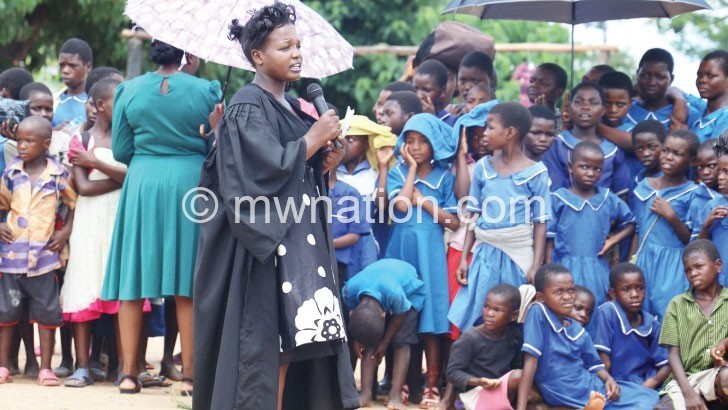Skills for youths at risk
Tionge M’meta has survived numerous hardships prevalent in rural communities near Liwonde Trading Centre in Machinga to become an empowered woman who meets her personal and family needs singlehandedly.
The 26-year-old from Namandanje Village has overcome widespread poverty, peer pressure and cultural indifference which force many adolescent girls into sexual partnerships that fuel teen pregnancies, child marriage, school dropouts and sexually transmitted infections, including HIV and Aids.

Today, M’meta and 25 other young women from her village have been transformed—thanks to the works of their hands.
They are among 145 young people who have received technical, entrepreneurial and vocational skills training through Yes I Do project that Plan Malawi is implementing in Machinga and Lilongwe.
“Most of us engaged in risky lifestyles that resulted in teen pregnancies and marrying young, but now we are self-reliant. We thank Plan for helping us to acquire skills. Even women can do jobs that were previously deemed a men’s territory,” says M’meta, who has completed training in bakery.
Most of the young women either got pregnant or married before their 18th birthday.
According to the 2015 Malawi Demographic Health Survey, almost half of Malawian women marry before the legal marriage age and a third of girls get pregnant aged below 19.
Some of the teen mothers in Mmeta’s group are raising children singlehandedly after their childhood lovers fled to South Africa in search of jobs and better economic prospects.
Teresa Sinoya, from Ngongonda Village in Machinga, was in Standard Five when she dropped out of school to marry. She struggles to raise the baby after walking away from the marriage she regrets.
“The marriage did not last long. My husband disappeared after I got pregnant with our second child. He left me with a difficult responsibility to raise two children all alone,” she narrates.
Sinoya has completed training in motorcycle mechanics, a skill she hopes will lessen the burden.
Last week, she was among 45 young people, including 26 women, who received certificates in various trades after completing the six-month training Plan Malawi conducted in partnership with Technical, Entrepreneurial and Vocational Education and Training Authority (Teveta).
Apart from bakery and motorcycle mechanics, other fields are tailoring and design, wielding and fabrication, vehicle body repairing, motorcycle mechanics, carpentry and joinery, bricklaying and hairdressing.
The Yes I Do project tackles idleness and other risk factors which expose vulnerable young people in Liwonde to risky sexual behaviour.
“We are happy that these young men and girls have been economically empowered for their own benefit and that of their families, community and country,” says project manager Joseph Maere.
The trainees received start-up tools such as sewing machines, drilling gear and carpentry equipment from Plan Malawi to help them start businesses.
Senior Chief Liwonde says many young people in the remote locality are jobless with “educational certificates in their pocket” because they have no skills.
The traditional leader reckons the youth need relevant skills to compete favourably for few opportunities on the job market.
“These young people are lucky. I urge them to put the knowledge and skills they have acquired to good use by establishing small businesses that can make them self-reliant, sustain their livelihoods, support their families and employ their peers who haven’t been as lucky,” he says.
Maere described the initiative as a milestone that has helped reduce cases of child marriages and teenage pregnancies in Machinga and Njewa in Lilongwe. Some 145 adolescents—95 girls and 55 boys—have acquired skills in the two target communities.
“Poverty is the main driver of child marriages in the country, so this training seeks to empower the youth with relevant skills to become role models their communities can look up to and realise that life entails so much more than just getting married,” he says.
Maere urges Malawians to support the trainees’ businesses and products as some of them are already running tailoring, carpentry and hairdressing shops.
“We are impressed that they started doing something on their own before receiving start-up equipment. Interestingly, they are not just keeping the skills to themselves, but training their peers who are vulnerable to child marriage and risky sexual behaviour,” he added.
Victor Luwambala, Teveta regional manager (South), urged the young artisans to use the skills and tools wisely.
“Use what you have to improve your livelihood and expand the skills as their future now depends on what you do with the skills you now have,” he said.
He commended Plan for complementing government’s plans to expand access to skills development for young people, especially those in rural areas.
Since 2015, government has introduced community technical colleges in all three regions.
Machinga district commissioner Rosemary Nawasha asks other partners to invest in uplifting young Malawians in rural areas.
She says: “Machinga rates highly when it comes to unemployment and early pregnancies, so this initiative will help keep boys and girls busy while protecting them from risky lifestyles and moulding them to become entrepreneurs.
“The district will also benefit in terms of development and improved livelihoods in the communities where the trainees live.”
Nawasha asked the beneficiaries of the skills development programme to employ and train their peers.


